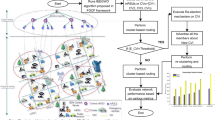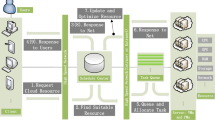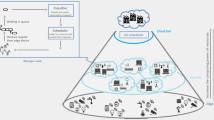Abstract
Vehicular edge computing (VEC), which extends the computing, storage, and networking resources from the cloud center to the logical network edge through the deployment of edge servers at the road-side unit (RSU), has aroused extensive attention in recent years, by virtue of the advantages in meeting the stringent latency requirements of vehicular applications. VEC enables the tasks and data to be processed and analyzed in close proximity to data sources (i.e., vehicles). VEC reduces the response latency for vehicular tasks, but also mitigates the burdens over the backhaul networks. However, how to achieve cost-effective task offloading in VEC remains a challenging problem, owing to the fact that the computing capabilities of the edge server are not sufficient enough compared to the cloud center and the uneven distribution of computing resources among RSUs. In this paper, we consider an urban VEC scenario and model the VEC system in terms of delay and cost. The goal of this paper is to minimize the weighted total latency and vehicle cost by balancing the bandwidth and migrating tasks while satisfying multiple constraint conditions. Specifically, we model the task offloading problem as a weighted bipartite graph matching problem and propose a Kuhn-Munkres (KM) based Task Matching Offloading scheme (KTMO) to determine the optimal offloading strategy. Furthermore, considering the dynamic time-varying features of the VEC environment, we model the task migration problem as a Markov Decision Process (MDP) and propose a Deep Reinforcement Learning (DRL) based online learning method to explore optimal migration decisions. The experimental results demonstrate that our strategy has better performance compared to other methods.















Similar content being viewed by others
Data availability
The data supporting the findings of this work can be obtained from the corresponding author upon reasonable request.
References
Tang, C., Chen, W., Zhu, C., et al.: When cache meets vehicular edge computing: architecture, key issues, and challenges. IEEE Wirel. Commun. 29(4), 56–62 (2022). https://doi.org/10.1109/MWC.202.2100159
Liu, B., Jia, D., Wang, J., et al.: Cloud-assisted safety message dissemination in VANET–cellular heterogeneous wireless network. IEEE Syst. J. 11(1), 128–139 (2017). https://doi.org/10.1109/JSYST.2015.2451156
Tang, C., Wei, X., Zhu, C., et al.: Towards smart parking based on fog computing. IEEE Access 6, 70172–70185 (2018). https://doi.org/10.1109/ACCESS.2018.2880972
Zeng, F., Chen, Q., Meng, L., et al.: Volunteer assisted collaborative offloading and resource allocation in vehicular edge computing. IEEE Trans. Intell. Transp. Syst. 22(6), 3247–3257 (2021). https://doi.org/10.1109/TITS.2020.2980422
Liu, S., Liu, L., Tang, J., et al.: Edge computing for autonomous driving: opportunities and challenges. Proc. IEEE 107(8), 1697–1716 (2019). https://doi.org/10.1109/JPROC.2019.2915983
Wang, B., Wang, C., Huang, W., et al.: A survey and taxonomy on task offloading for edge-cloud computing. IEEE Access 8, 186080–186101 (2020). https://doi.org/10.1109/ACCESS.2020.3029649
Tang, C., Zhu, C., Wu, H., et al.: Toward response time minimization considering energy consumption in caching-assisted vehicular edge computing. IEEE Internet Things J. 9(7), 5051–5064 (2022). https://doi.org/10.1109/JIOT.2021.3108902
Han, S., Li, Y., Meng, W., et al.: Indoor localization with a single Wi-Fi access point based on OFDM-MIMO. IEEE Syst. J. 13(1), 964–972 (2019). https://doi.org/10.1109/JSYST.2018.2823358
Qiao, G., Leng, S., Zhang, K., et al.: Collaborative task offloading in vehicular edge multi-access networks. IEEE Commun. Mag. 56(8), 48–54 (2018). https://doi.org/10.1109/MCOM.2018.1701130
Tang, C., Wu, H.: Optimal computational resource pricing in vehicular edge computing: a Stackelberg game approach. J. Syst. Architect. 121, 102331 (2021). https://doi.org/10.1016/j.sysarc.2021.102331
Munkres, J.: Algorithms for the assignment and transportation problems. J. Soc. Ind. Appl. Math. 5(1), 32–38 (1957). https://doi.org/10.1137/0105003
Raza, S., Wang, S., Ahmed, M., et al.: A survey on vehicular edge computing: architecture, applications, technical issues, and future directions. Wirel. Commun. Mob. Comput. 2019, 1–19 (2019). https://doi.org/10.1155/2019/3159762
Anawar, M.R., Wang, S., Azam Zia, M., et al.: Fog computing: an overview of big IoT data analytics. Wirel. Commun. Mob. Comput. 2018, 1–22 (2018). https://doi.org/10.1155/2018/7157192
Hou, X., Li, Y., Chen, M., et al.: Vehicular fog computing: a viewpoint of vehicles as the infrastructures. IEEE Trans. Veh. Technol. 65(6), 3860–3873 (2016). https://doi.org/10.1109/TVT.2016.2532863
Kim, Y., Kwak, J., Chong, S.: Dual-side optimization for cost-delay tradeoff in mobile edge computing. IEEE Trans. Veh. Technol. 67(2), 1765–1781 (2018). https://doi.org/10.1109/TVT.2017.2762423
Liu, H., Zhao, H., Geng, L., et al.: A Distributed Dependency-Aware Offloading Scheme for Vehicular Edge Computing Based on Policy Gradient. In: 2021 8th IEEE International Conference on Cyber Security and Cloud Computing (CSCloud)/2021 7th IEEE International Conference on Edge Computing and Scalable Cloud (EdgeCom), pp 176–181, https://doi.org/10.1109/CSCloud-EdgeCom52276.2021.00040 (2021)
Dai, Y., Xu, D., Maharjan, S., et al.: Joint load balancing and offloading in vehicular edge computing and networks. IEEE Internet Things J. 6(3), 4377–4387 (2019). https://doi.org/10.1109/JIOT.2018.2876298
Zhang, J., Guo, H., Liu, J., et al.: Task offloading in vehicular edge computing networks: a load-balancing solution. IEEE Trans. Veh. Technol. 69(2), 2092–2104 (2020). https://doi.org/10.1109/TVT.2019.2959410
Guo, H., Zhang, J., Liu, J.: FiWi-enhanced vehicular edge computing networks: collaborative task offloading. IEEE Veh. Technol. Mag. 14(1), 45–53 (2019). https://doi.org/10.1109/MVT.2018.2879537
Yuan, H., Zhou, M.: Profit-maximized collaborative computation offloading and resource allocation in distributed cloud and edge computing systems. IEEE Trans. Autom. Sci. Eng. 18(3), 1277–1287 (2021). https://doi.org/10.1109/TASE.2020.3000946
Sun, Y., Guo, X., Song, J., et al.: Adaptive learning-based task offloading for vehicular edge computing systems. IEEE Trans. Veh. Technol. 68(4), 3061–3074 (2019). https://doi.org/10.1109/TVT.2019.2895593
Qi, Q., Wang, J., Ma, Z., et al.: Knowledge-driven service offloading decision for vehicular edge computing: a deep reinforcement learning approach. IEEE Trans. Veh. Technol. 68(5), 4192–4203 (2019). https://doi.org/10.1109/TVT.2019.2894437
Taleb, T., Ksentini, A., Frangoudis, P.A.: Follow-me cloud: when cloud services follow mobile users. IEEE Trans. Cloud Comput. 7(2), 369–382 (2019). https://doi.org/10.1109/TCC.2016.2525987
Moon, S., Park, J., Lim, Y.: Task migration based on reinforcement learning in vehicular edge computing. Wirel. Commun. Mob. Comput. 2021, 1–10 (2021). https://doi.org/10.1155/2021/9929318
Huang, L., Bi, S., Zhang, Y.J.A.: Deep reinforcement learning for online computation offloading in wireless powered mobile-edge computing networks. IEEE Trans. Mob. Comput. 19(11), 2581–2593 (2020). https://doi.org/10.1109/TMC.2019.2928811
Liu, B., Jiang, X., He, X., et al.: A deep learning-based edge caching optimization method for cost-driven planning process over IIoT. J. Parallel Distrib. Comput. 168, 80–89 (2022). https://doi.org/10.1016/j.jpdc.2022.06.007
Ning, Z., Dong, P., Wang, X., et al.: Deep reinforcement learning for vehicular edge computing an intelligent offloading system. ACM Trans. Intell. Syst. Technol. 10(6), 1–24 (2019). https://doi.org/10.1145/3317572
Yuan, Q., Li, J., Zhou, H., et al.: A joint service migration and mobility optimization approach for vehicular edge computing. IEEE Trans. Veh. Technol. 69(8), 9041–9052 (2020). https://doi.org/10.1109/TVT.2020.2999617
Wang, Z., Ng, D.W.K., Wong, V.W.S., et al.: Robust beamforming design in C-RAN with sigmoidal utility and capacity-limited backhaul. IEEE Trans. Wirel. Commun. 16(9), 5583–5598 (2017). https://doi.org/10.1109/TWC.2017.2712645
Acknowledgements
This work is supported by the National Natural Science Foundation of China under Grant Number 62071327, 62271486 and 62071470.
Author information
Authors and Affiliations
Corresponding author
Ethics declarations
Conflict of interest
The authors declare that they have no known competing financial interests or personal relationships that could have appeared to influence the work reported in this paper.
Rights and permissions
Springer Nature or its licensor (e.g. a society or other partner) holds exclusive rights to this article under a publishing agreement with the author(s) or other rightsholder(s); author self-archiving of the accepted manuscript version of this article is solely governed by the terms of such publishing agreement and applicable law.
About this article
Cite this article
Tang, C., Li, Z., Xiao, S. et al. A bandwidth-fair migration-enabled task offloading for vehicular edge computing: a deep reinforcement learning approach. CCF Trans. Pervasive Comp. Interact. (2024). https://doi.org/10.1007/s42486-024-00156-x
Received:
Accepted:
Published:
DOI: https://doi.org/10.1007/s42486-024-00156-x




